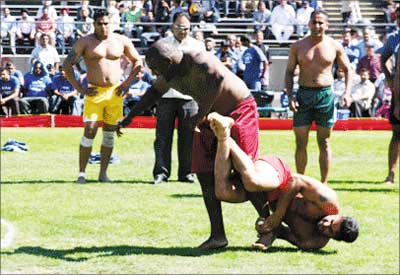 When police Inspector Barry Dolan proposed that Toronto police officers take up kabaddi to promote better relations with the large Indian and Pakistani community who live in the city not many people were amused.
When police Inspector Barry Dolan proposed that Toronto police officers take up kabaddi to promote better relations with the large Indian and Pakistani community who live in the city not many people were amused.
He had to fight hard, Dolan says, to get the greenlight, and after several weeks of persuading his superiors, he formed what would soon be called the first non-South Asian kabaddi team in the world. The team comprised of white police officers.
Dolan started thinking of forming the team following a prolonged protest in 2002 over racial profiling. As an undercover police officer, he had encountered various layers of the South Asian community and had discovered that apart from cricket, kabaddi meant a lot to the people in the area under his supervision, even to those who were born in Canada.
The kabaddi clubs in the area took themselves so seriously that they went after the athletes from both sides of the Punjab and enrolled them in the tournaments.
Now, a 24-minute long documentary Kabaddi Cops, which is becoming a film festival favourite, is celebrating the success of the four-year-old team and its role in trying to address the mistrust and fear the South Asian community had of the Toronto police.
It is among the many intriguing documentaries and short films being shown at the current sixth annual Indo-American Arts Council Film Festival in New York.
"It is one of the must see films for me at the festival," the bestselling author Salman Rushdie said at his inaugural address at the festival on Wednesday, November 1. "The idea of a bunch of Canadian policemen learning kabaddi in order to integrate with the Asian community is something I wish to see.
He also wanted to "see Mahatma Gandhi appearing for the New York Yankees in Gandhi at the Bat," he said referring to the 11-minute film based on a Chet Williamson story in The New Yorker in 1983. Calling it one of the funniest stories he had read in the magazine, Rushdie said he is convinced the short film "is worth the price of admission."
Directed by Greg Cote, a former police officer and private investigator, Kabaddi Cops shows how Dolan went around convincing fellow officers and juniors who knew nothing about the 4,000-year-old sport.
Within a year the team began competing in the tournaments and getting their stories in major publications and television shows in Toronto.
The community grudgingly started appreciating the police efforts to make inroads and build the bridges, according to Cotes. The police team and the Ontario Khalsa Darbar kabaddi team are looking to set up a permanent kabaddi field.
'The more time you spend learning about another culture,' Dolan, who has become the team coach, reflected in the documentary, 'the more you grow to love it and respect it.'
Team captain Constable Dirk Niles says he was afraid to try it out first but took kabaddi as a challenge. 'I never knew it was bare foot, bare back, no mouth guard and running around out on the field,' he said. Community leader Kuldip Kular did not have to wait for long to appreciate the police efforts. 'When the police get involved,' he said, 'it makes our community safe, strong and caring.'
As for Cote there could not be a more progressive step ever taken by a Canadian police department than the starting of the kabaddi club.
'I feel the underlying message of Kabaddi Cops is very important in terms of race relations and promoting harmony between the state and diverse communities.' he said in a statement.

